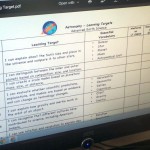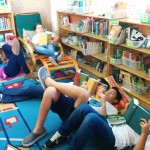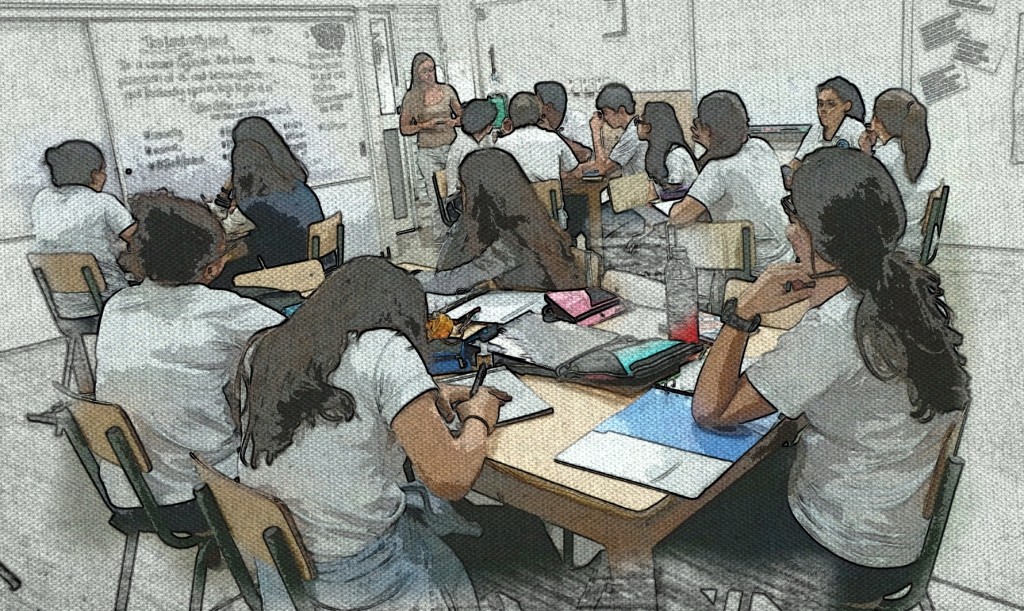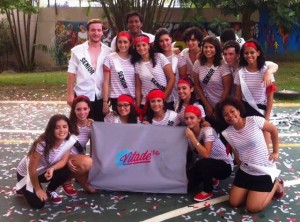Students Reflect on the Year
This year we had our five-year follow-up visit from NEASC (New England Association of Schools and Colleges) for our accreditation. Two wonderful educators, Steve MacDougall and Jocelyn Mackey, came to oversee us. They were masters at giving feedback: they started out by pointing out our strengths and then made suggestions about how we could build on them to improve our school. This left us feeling proud of our accomplishments and eager to jump in and accept the challenges for improvement.
One of the suggestions they gave us was simple and powerful… one of those “Why didn’t I think of that??” ideas. They suggested we meet with our student council and involve them in improving the school.
So we did.
In the last week of school, we met with our presidents and vice presidents from 9th – 11th grades (our 12th graders had already graduated – next year we’ll do this a week earlier!). Lincoln, Ylonka, and I sat in a circle with the eight students and began by asking them to reflect on what they felt went well this year and then what they felt we could improve on. The comments they made were amazing. First of all, we couldn’t believe how clear they are about what good teaching looks like and how it affects them. Next we asked them what we could improve on. We were worried that they would begin to complain about every little thing. But they didn’t. Instead they responded with maturity, explaining what they felt was wrong and giving excellent ideas for solutions.
What went well this year:
- Class government:
- Working together for fundraisers – teachers were supportive and flexible in allowing them to meet their goals.
- The 11th grade “lansamiento” (launching of the new senior class) – teachers were understanding and gave them time to prepare.
- They had time for class meetings.
- Cross-curricular work:
- They did a lot of meaningful cross-curricular work especially in Language Arts, Social Studies, and Science. They feel that these are important because they focus on universal knowledge that they can use for the rest of their lives.
- When projects are integrated across subject areas, they had more time to do them. They stated that It’s easier to put effort into a project that will give them a grade in two or three subjects, rather than doing different projects for each class.
- They learn more when they study the same theme in different subjects. For instance, reading The Book Thief in Language Arts gives them a better understanding of the WWII lessons in History class.
- New teaching techniques:

- They liked the learning targets (some of our teachers were involved in a book study of Leaders of Their Own Learning and were experimenting with giving clear learning targets). This helped make learning objectives clear. In some classes, they’re not always sure when a topic ends and another begins, but with learning targets they had a clear idea.
- The said that the flipped classroom they did in SS worked well. They did the reading and lectures at home and then, in class, they reflected on them and had discussions. They felt that this worked because when they’re at home, they’re usually tired and they don’t get teacher feedback, so it’s easier just to do the more passive “lecture” part there, rather than the more difficult “thinking part” of the work. In class, not only do they get support from the teachers but they also get the opportunity to hear other kids’ ideas, broadening their horizons so they learn more from the assignments they do.
 The splitting up of the independent and shared reading blocks in Language Arts and Lenguaje (this year we did 4 – 6 weeks of shared reading and then 4 – 6 weeks of independent reading, rather than having kids manage independent reading outside of class while they did shared reading in class). They could focus on one book and really get into reading.
The splitting up of the independent and shared reading blocks in Language Arts and Lenguaje (this year we did 4 – 6 weeks of shared reading and then 4 – 6 weeks of independent reading, rather than having kids manage independent reading outside of class while they did shared reading in class). They could focus on one book and really get into reading.- The book projects and activities that took the place of comprehension questions made class more exciting and interesting. Comprehension questions were given less frequently so they didn’t mind them and did a better job of them.
- The new format for note taking. Teachers put information on Google Drive and then project it onto the board while talking and explaining. They know that they can go to Google Drive and access those notes later, so instead of focusing on copying them down, they can listen to the teacher’s explanation and learn more. But, they stipulated, even if it’s on the Drive teachers still have to explain the information. The material is sometimes hard to grasp so the teacher needs to go over it with them, especially in Science.
- They liked sharing their work with people outside of the school, because they felt the feedback they got was more meaningful. When they present in front of their parents they know their audience is biased. Strangers are harsher critics and the feedback feels more real. Also, when they know that strangers will see their work, they’re motivated to do a better job.
- They like the experimenting they do in Science – instead of lectures, the learning is hands-on. They feel this format should be incorporated more into other classes. At the same time, they felt there should be a balance of hands-on work and lectures… they still do need the lecture information.
Areas to improve:
- Class government:
- They need teacher support. Mentoring from the homeroom teacher would help.
- Letting parents know that students need to pay dues. They felt that the administration could support them by sending an informative letter to the parents along with occasional reminders.
- When planning their fund raising activities, they need time for a longer meeting, since a half hour at lunch time is not enough. They suggested homeroom plus first period (this would only be necessary a few times per year) They felt that having the homeroom teacher work as a mediator would help them accomplish more.
- For family fun day, the school should have a meeting with the heads of class to let them know the rules of their fundraising activities.
- Teaching strategies:
- From their perspective, the two weeks before grades are due, are crazy. Teachers try to cram in all the missing grades they have. They feel that teachers should give quizzes and other forms of assessment more regularly throughout the trimester.
- Teachers complain that kids don’t hand their work in on time, but often those teachers are slow to return graded work. They notice that students tend to hand in work more punctually to those teachers who give their work back quickly.
- They find group work hard because they’re sometimes forced to work with people who don’t pull their weight, and group grades are often unfair. Teachers can help by making sure the work is divided and that each person is graded on their individual part, not on the group as a whole. Sometimes teachers give an individual grade AND a group grade (for the presentation), so if someone doesn’t present well, everyone pays for it.
- University applications:
- It would be helpful to have a calendar with SAT information, posters, etc.
- They feel that it would be great to have more information about the university process – what are the SATs? Do they need the ASCT? What does early action mean?
- They would like to have scheduled check-in meetings with the counselor to see how they’re doing with the application process.
Asking students for their end-of-year reflections is a strategy we’ll be using every year from now on. Not only did we get excellent feedback, but giving students space to share their ideas empowered them. We heard a lot of “This was so cool. Thank you for listening to us… this is the best school!”
We agree with their suggestions for areas of improvement, and most of the solutions can be implemented fairly easily. But the biggest eye-opener was the realization that the changes in methodology we’ve been working on have been so obvious to them and so well-received. This motivates us to keep going!



Leave a comment